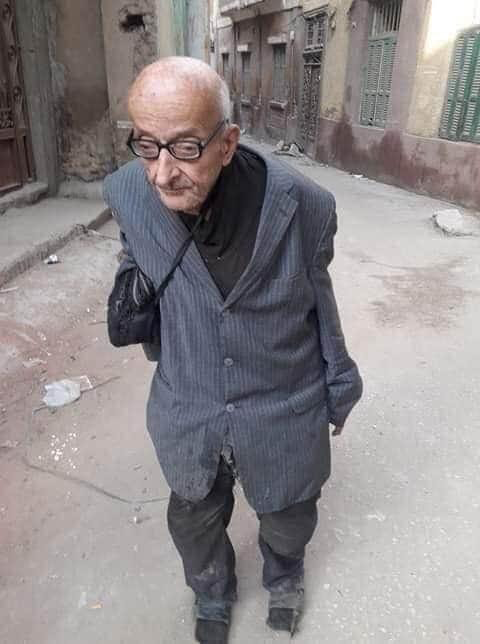CAIRO: “I pledged to God that I would not take a penny from a poor person and that I would remain in my clinic to help the poor.” This selfless statement sums up the attitude and benevolence of Egyptian doctor Mohammed Mashaly, who died on Tuesday morning at the age of 76.
Thousands of people turned out to pay their respects and say farewell to Mashaly — known simply as “the doctor of the poor” — in his home village of Zahr El-Temsah, in the Beheira governorate of northern Egypt. His body was taken there from the city of Tanta, where he lived and worked.
The crowds that marched in his funeral procession reflected the love, admiration and appreciation for Mashaly. He became renowned in his country as the doctor who would take only 5 Egyptian pounds ($0.30) as payment for a visit to his office. He was featured in a number of TV programs and news reports, and many state institutions honored him for his work and generosity.
Viewers were particularly moved by a TV interview in which he cried as he spoke of an experience he had when he started working at a health center in a poor area.
“A little diabetic child came to me crying from pain and telling his mother to inject him with insulin,” he said. “The mother replied to the child, saying that if she buys the insulin shot she would have no money to buy food for his siblings. I still remember that harsh situation, which made me decide to devote my knowledge to treating the poor.”
He said that he kept his fee low and sometimes he did not take any money at all from the poorest people and provided them with free medications, too.
Commenting on his decision to turn down a donation worth millions from a TV show, he said: “I reject donations and I advise them to offer such donations to the poor and needy.
“I don’t need the donations. Give such donations to homeless children or children with no shelter. Anyone who wishes to give me donations can give them to Gharbeya governorate so it can allocate the money for needy people.”
Mashaly grew up in a poor family and built his career from nothing. He struggled to educate his own children and his brother’s children, yet still he chose to help the poor and those on limited incomes.
His brother, Dr. Osama Mashaly said his sibling was more like father to him, and was his role model. “The doctors in the family shall continue Dr. Mashaly’s approach,” he said. “However, I don’t think that his own clinic will open again, since his three children are engineers.”
Mashaly continued help the patients at his clinic in Tanta until until shortly before his death, said Dr. Hashem Mohammed, who worked as his assistant since the mid-1990s.
“Dr. Mashaly came to the clinic and he was in good health,” he said. “He actively performed his role and was always smiling.”
Mashaly frequently spoke of one final wish, said Mohammed: that he could continue to do his job at the clinic and treat his patients until he died.
“He never wanted to stop offering help and support to the poor,” he added.
Mohammed denied rumors that Mashaly had fallen ill on Monday night and was taken to hospital where he died a few hours later. He said the doctor passed away at his home in Tanta.
Mashaly was born in Beheira governorate in 1944. His father, a teacher, later moved the family to Gharbeya. He graduated from the Faculty of Medicine at Cairo University in 1967, and specialized in epidemiology, internal medicine and pediatrics. He worked at health clinics and centers affiliated with the Ministry of Health in a number of areas.
Eight years after graduating, Mashaly opened a private clinic in Gharbeya governorate, where he became famous for the reduced fees he charged patients. His work day began at 7.30 a.m. and he continued to see patients until the Maghreb prayer. He would then go home to eat before visiting two other clinics in neighboring villages to examine patients.
Many people and organizations posted messages on social media expressing their sadness about the doctor’s death and paying tribute to him and his work.
In a message on Facebook, Ahmed El-Tayeb, the Grand Imam of Al-Azhar Mosque, wrote: “May God grant mercy to the doctor of the poor, Dr. Mohamed Mashaly.”
He said the doctor was a great example of humanity and added: “He knew that life is mortal. Thus, he preferred to help poor and needy patients even during the last days of his life.”
Egypt’s Doctors Syndicate said it mourned the loss of Mashaly and sent its condolences to his family.
#طبيب_الغلابه You made us believe that this life is full of great meanings that we have to live for
Thanks for spreading Good values that were about to disappear
Rest in peace pic.twitter.com/4YH06DsbZe— حسّو (@umihfc1) July 28, 2020
When humanity, ethics and religion gather in a person who lives in a lost society. #طبيب_الغلابه pic.twitter.com/8aAeP4wxSs
— AHMED (@Ahhhmxd) July 28, 2020


























